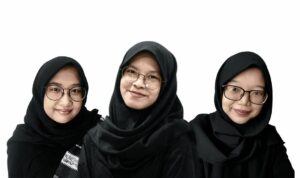
DESIGNING LIVING IN TUNNEL AS AN ALTERNATIVE TO HOUSING FOR THE HOMELESS, FTUI STUDENTS WON AN INTERNATIONAL AWARD FROM LAS VEGAS
Three students from the Department of Architecture, the Faculty of Engineering, Universitas Indonesia (DA FTUI), used an unused tunnel as an alternative to housing for the homeless. Their design, called “Living in Tunnel”, won Honorable Mention Winners in the international competition of Las Vegas Affordable Housing Challenge organized by Buildner (Bee Breeders), which was announced on February 15, 2023.
These three students from the batch of 2019 are Dhiya Luthfiyyah, Lulu Safitri Wijaya Jonni, and Nadia Putri Humaira. In designing the “Living in Tunnel”, the students were directly guided by a Professor of DA FTUI, Prof. Ir. Evawani Ellisa, M.Eng., Ph.D.; Professional Architect, Baiq Lisa Wahyulina, S.T., M. Ars., IAI.; and Assistant Lecturer, Aulia Urrorhmah, S.Ars.
This competition raises the issue of homelessness as one of the biggest problems in Las Vegas. Even though Las Vegas is known as the “Entertainment City”, data says that in 2022, this city has 5,645 homeless people. Beneath the glitter of the city, there is infrastructure in the form of tunnels, which were built in anticipation of a flood. In reality, floods never hit this city and left the tunnels as unused spaces.
People without a home (the homeless) live in these empty tunnels. Using flood tunnels as shelters, Las Vegas’ homeless seek to create their own living space. They live and survive without being supported by adequate housing facilities such as clean water, sanitation facilities, or lighting.
“After trying to understand the situation of Las Vegas through a study of secondary data, we see those tunnels as an opportunity. The “Living in Tunnel” design aims to address not only the homeless crisis in Las Vegas but also social challenges through the idea of living in a tunnel. Living in tunnels is part of the residents’ instinct to survive and has the potential to be one of the solutions to overcome the problem of landlessness at an affordable price,” said Prof. Evavani Elisa.
She added, “Unused tunnels can be utilized as the main structure. The only thing that needs to be done is to build construction units in them to fulfill the main requirement for this competition, which is affordable housing in Las Vegas.”

“In general, our idea to reduce development costs is designing with a modular concept in the tunnel. The modular and self-construction concept is flexible in nature according to the needs of prospective occupants. We propose small modules measuring 1×1 m which can be arranged and constructed by prospective occupants themselves based on their needs and desires,” said Nadia Putri.
“Besides being adaptive and affordable, these modules can be applied to other tunnels across Las Vegas. We propose a communal sanitation facility at the mouth of the tunnel. We position it in such a way that it is hidden from public view by the transitional space that lies between the road and the tunnel. We propose this transitional space to be used as a communal garden equipped with a mural,” said Nadia.
Dean of FTUI Prof. Dr. Heri Hermansyah, S.T., M.Eng., IPU. expressed his appreciation for the achievements of DA FTUI students. “The solution provided by the FTUI Architecture team in responding to the housing crisis in Las Vegas proves that FTUI students are resourceful and critical thinkers in responding to various phenomena. Congratulations to the team on your achievement. It indeed has made FTUI and UI proud.”

The Las Vegas Affordable Housing Challenge is a competition that challenges participants to submit the best design solutions to address the housing crisis in the city. They are encouraged to propose dynamic solutions to accommodate low-cost housing for different unit sizes, such as family, single professional, and couple units. In this competition, the jury looks for fresh ideas that can answer the challenge of a new typical housing design for the community. The design is also expected to prioritize practicality as well as have the potential to be realized.



